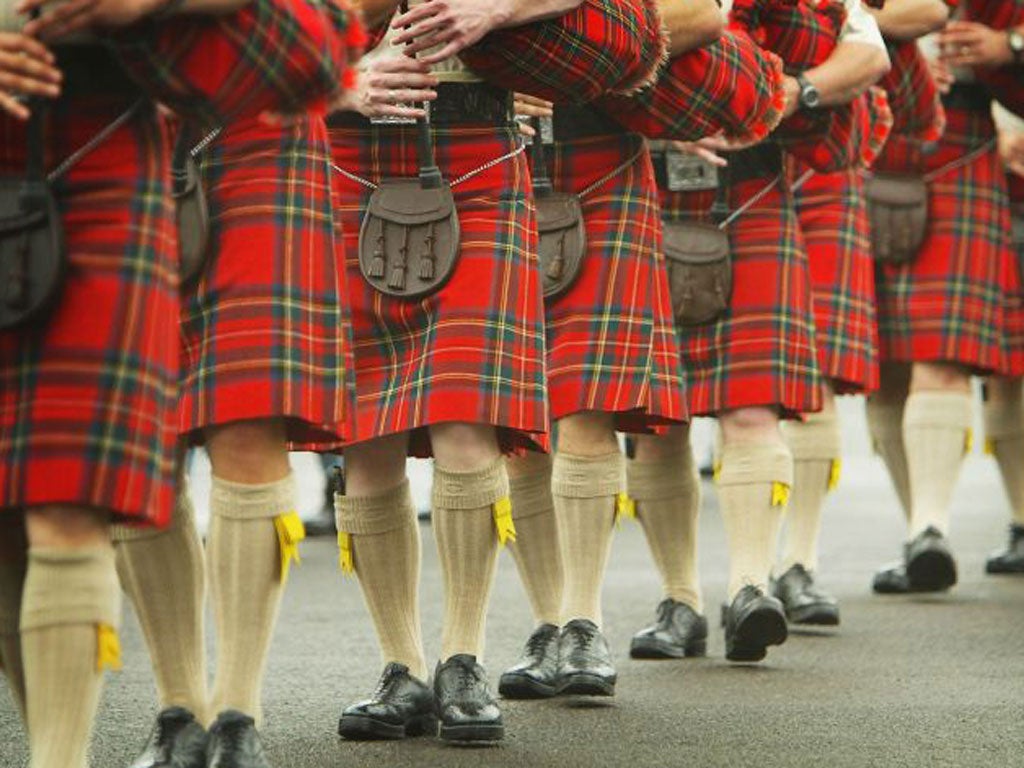The Big Music, By Kirsty Gunn
This masterly work of fiction illuminates the music, and magic, of the bagpipes

Kirsty Gunn has set herself a fearsome task. Writing about music, which lies at the heart of this "novel" (the quote marks are hers), is so difficult that almost everyone who tries, fails. And hers is a music which many find inaccessible, and some have never even heard of: the piobaireachd, the formal music of the Highland bagpipes. To take that, and to show us at its heart a love-song and a lullaby: she is a brave woman even to try.
The result isn't what you'd call a success; not even a qualified success. The result is a masterpiece. Gunn solves the problem she has set herself, not by writing about the music but, by some strange meticulous magic, writing within it.
Her story and the Céol Mòr - the Big Music of the title, grave, formal and intricate – inhabit each other. Rhythm and melody and the grace-notes at the heart of the piobaireachd echo back and forth with her gentle, moving narrative and glittering technical interpolations on the Great Music itself: who did it, how it's done, what it's about. We are not so much instructed as initiated.
The story itself is blurred, luminous, a tightly-disciplined poem as well as a set of variations upon a theme. It's uncertain who the narrator is, or whether this is a decorated history, or simply a fine instance of passing off fiction as documented fact in order to draw attention to its fictive slipperiness. There's a terrible temptation to find out, to check things on the internet, but to do so would be to miss the point. It would be like trying to understand Moby-Dick by swotting up flensing methodology and the Nantucket tide-tables.
The Big Music begins with a section headed Urlar: the "ground" or opening tune of piobaireachd, where it's a deceptively simple melodic figure. The urlar is echoed both in the rhythms and the import of her opening sentence: "The hills only come back the same: I don't mind..."
And there it is: John Sutherland, the (perhaps last) hereditary piper of the Grey House, walking into the Sutherland hills with a small child not his own, under his arm like the bag of his pipes. "He needs her for the tune..." That tune is his final composition, the Lament for Himself. His last word: the story of his life, in music. As we must all, in the end, lament for ourselves.
Even if you know nothing about the Big Music, the idea sends a shiver up the spine. Laments, summonings, salutes: these are the forms of the piobaireachd. Structurally, like the "novel" itself, they are a series of variations on the urlar. Because the pipes are always in tension with their endless lungs, their inability to articulate silence, they substitute the articulation of figure: complex clusters of grace notes, their time borrowed from the preceding note, so fast that they blur the ear as they land on the next note of the tune.
The Big Music has suffered at the hands of 18th-century Romanticism and of 19th-century Balmorality. The truth is that it is an intricate aesthetic system based on a centuries-old folk art, tunes handed down through the mnemonic singing called canntaireachd, or from teacher to student, "at the end of his chanter". As Gunn attributes to "the piper and composer RJC Gunn" (perhaps her father?), "this is the foundation of canntaireachd: the singing down of a tune, and often yes, a quiet and gentle singing. Remember, too, that one of the greatest piobaireachd ever written… is also a beautiful and very sad song. One hears the voice in it when it is well played."
He (or she) is speaking of the "Lament for the Children", written around 1650 by Padruig Mor MacCrimmon of Skye after seven of his eight sons died in what was probably a smallpox epidemic. I heard this once, played at sunset by a piper who I hadn't expected to hear when I pulled over to look at the map, pacing the flagstones of an old house by a loch: "Hard music. Hard on the piper. Hard on all of us."
But, also, hidden inside it, as there is hidden inside the book, is "a Lullaby... The smallest, gentlest song against the ground, against the broad and mindless hills like quietness set into the great layout of a tune."
I mentioned Moby-Dick earlier and there are similarities: the inter-grafting of desperately human stories against a grand harsh environment, with a magical series of variations and digressions on a single theme. Like a lullaby, the book hypnotises and tips over into sleep. In sleep it assembles itself into a deep and beautiful structure of love, loss and the irresistible continuity of music and time.
What's true? What's not? It doesn't matter. Some things certainly are "true", like The Kilberry Book of Céol Mòr – I have a copy – with such pieces as "The Desperate Battle", "King's Taxes", and "Unjust Incarceration". But whether or not Gunn's father was the piper "she" claims, I don't know. If he was, then she learned magic from the end of his chanter. The last variation is the "Crunluath a Mach": the last crown. Then the piper walks slowly away, returning to the beginning of his tune. I cannot think of a more entirely original, enchanting and enchanted book.
Join our commenting forum
Join thought-provoking conversations, follow other Independent readers and see their replies
Comments